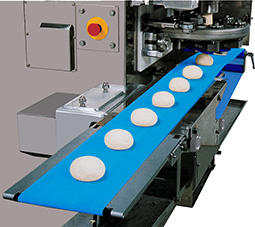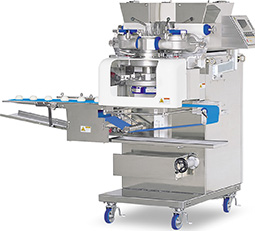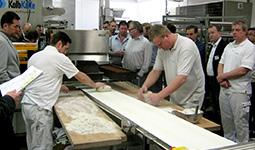Home > Highlighting JAPAN > Highlighting Japan February 2017 > New Pioneers of Local Development
Highlighting JAPAN
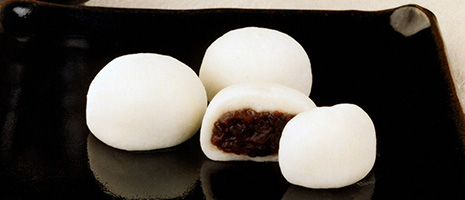
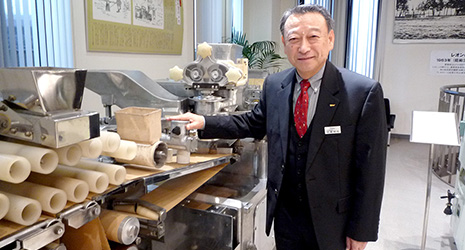
Filling a Need
A food-processing technology developed by a Japanese confectioner more than fifty years ago is now utilized in more than 120 countries around the world.
There are as many as 4.2 million companies in Japan, 99.7% of which are small and medium-sized enterprises. Among these are local businesses with a big presence on the world stage which have grown by making use of unique technologies. For example, Nippura Co. in Kita-gun, Kagawa Prefecture controls about 70% of the global market for acrylic panels for aquariums, while Yanagiya Machinery Co. in Ube City, Yamaguchi Prefecture has about 70% of the global market for kanikama (imitation crab meat) manufacturing machines.
Another such company is Rheon Automatic Machinery Co., a food machinery manufacturer headquartered in Utsunomiya, Tochigi Prefecture. Torahiko Hayashi, the founder of Rheon Automatic Machinery, originally opened a small Japanese confectionery shop in Kanazawa, Ishikawa Prefecture in 1950.
“I have heard that confectioners had to work very hard at that time. They had to repeat simple manual tasks from the early morning until the late evening to wrap sweet bean paste in rice cakes,” says Akinori Nakao, the executive director of Rheon Automatic Machinery.
Hayashi had been eager to improve the livelihoods of Japan’s confectioners fearing no one would succeed to the confectionery business and that the Japanese tradition of confectionery making would disappear.
Hayashi worked hard on the development of an encrusting machine for automatically wrapping sweet bean paste in rice cakes, a machine that no one had previously attempted to make.
After a period of trial and error, Hayashi decided he needed to study rheology to learn about the elasticity and viscosity of Japanese confectionery.
In 1954 he moved to the Kinugawa hot spring area of Tochigi, and continued to work hard on development of an encrusting machine alongside a skilled blacksmith in his neighborhood.
Hayashi finally completed the world’s first encrusting machine in 1961 and started sales of the N101 Type in 1963. The machine features two rotating discs which together draw the rice cake into the center of the machine and automatically encrust the filling. The N101 Type was able to produce 3,000 confections per hour, or ten times as many as skilled and experienced confectioners.
That same year, Hayashi founded Rheon Automatic Machinery. Just four years later, the company successfully developed another type of encrusting machine, called the 200 Series, which was able to automate the processing of many other foods, and began to move toward the export of machines.
There are many kinds of food items made by wrapping one ingredient in another around the world, such as the knödel dumplings of central Europe, the British Scotch egg, the pirozhki breads of Eastern Europe and Indian samosas. These foods take so much time and effort to cook that people do not make them at home very often. Hayashi anticipated that if the automation of making these foods enabled people to eat them easily at restaurants, it would also lead to preserving traditional regional and ethnic food cultures.
In 1974, Hayashi developed the MM Line for spreading pie dough thin and piling one piece on top of another. This invention enabled the mass production of pies and Danish pastries, which had previously been handmade by bakers, through automation, which made these foods more accessible to ordinary people.
In the same year, Rheon Automatic Machinery established local companies as sales and marketing bases and set up laboratories in the United States and (former West) Germany. Since then, the company has continued to develop new products in response to customer needs in a wide range of countries and regions.
Rheon Automatic Machinery, which started as a small factory in Utsunomiya, has now grown into a large corporation with thirty-one partner companies selling its products in Europe, twenty-two in Asia and twenty in the United States, and exports products to 121 countries all around the world (2016 figures).
“We have partner companies in many parts of the world to let customers know the full working performance of our products and to provide sufficient after-sales service. We currently have seven research teams at the head office to work on researching applications for our machines and develop new menus in a variety of food areas,” says Nakao.
Hayashi declared a policy of “being a company with a reason for existence,” which means the company keeps on contributing to society. Rheon Automatic Machinery will continue to contribute to the succession and development of worldwide food cultures through streamlining and modernizing food production using innovative machines based on unique ideas.
© 2009 Cabinet Office, Government of Japan
